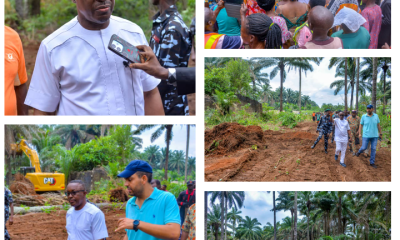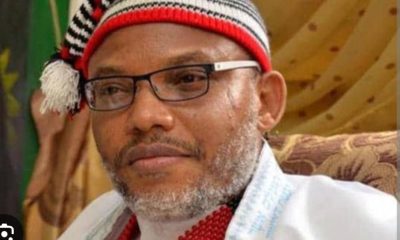OPINION
Silencing Critics Is Symptom Of A Government Drifting Towards Authoritarianism, Dictatorship

BY ISAAC ASABOR*
In every democracy, criticism and opposition play an important role in maintaining checks and balances, ensuring transparency, and protecting citizens’ rights. When governments begin to silence dissenting voices, critics, or opposition, it signals a dangerous shift towards authoritarianism and dictatorship. Throughout history, governments that have followed such paths have frequently devolved into repressive regimes, suffocating freedom and plunging their countries into chaos. The pattern is clear: when voices of opposition are routinely silenced, democracy is jeopardised.
Adolf Hitler’s regime in Nazi Germany is a well-known example of a government silencing opposition in order to consolidate power. After taking power in 1933, Hitler wasted no time in dismantling democratic institutions and suppressing dissent. The Reichstag Fire Decree and the Enabling Act of 1933 effectively granted Hitler dictatorial powers, allowing him to silence critics, ban opposition parties, and suppress all forms of dissent. Journalists, intellectuals, and political opponents were imprisoned or killed. The suppression of free speech and critical voices paved the way for a brutal authoritarian regime, which resulted in some of human history’s darkest moments.
In the Soviet Union, Joseph Stalin’s reign of terror demonstrated the dangers of silencing the opposition. Stalin orchestrated the Great Purge (1936-1938), in which millions of people, including political opponents, intellectuals, and even former allies, were executed or sent to labour camps. Stalin’s regime tightly controlled the media, suppressing any dissenting voices, while the secret police (NKVD) ensured that government critics were swiftly punished. The result was a highly centralised and repressive government that crushed any opposition while instilling fear and surveillance.
Following a military coup in 1973, General Augusto Pinochet took control of Chile and established a military dictatorship. Pinochet’s regime was characterised by brutal repression of opposition. Thousands of people, including activists, politicians, and journalists, were tortured, murdered, or disappeared. Censorship was widespread, and any voices criticising the government were quickly silenced. Pinochet’s government was characterised by a disregard for democratic processes, with power concentrated in his hands and the military, effectively silencing all forms of dissent.
Robert Mugabe, who led Zimbabwe from independence in 1980 until his forced resignation in 2017, transitioned from a revolutionary leader to an authoritarian ruler. Mugabe’s government was notorious for suppressing dissent through intimidation, violence, and legal action against opposition leaders and journalists. In the 2000s, Mugabe’s media crackdown resulted in the closure of independent newspapers and the harassment of journalists who criticised his regime. His government rigged elections, suppressed civil society, and used security forces to quell protests, cementing his grip on power.
Nigeria’s dark era under General Sani Abacha is a poignant example of a government suppressing opposition to consolidate dictatorial power. Human rights violations were rampant under Abacha’s regime. The press was censored, and critics of the government were imprisoned or forced to flee. The infamous 1995 execution of Ken Saro-Wiwa and eight other Ogoni activists, despite international condemnation, exemplified Abacha’s ruthlessness in silencing opposition. Political activists, journalists, and opposition figures were targeted, fostering a climate of fear that stifled all forms of public dissent.
Many countries today are showing signs of creeping authoritarianism as governments use strategies to silence critics and opposition. For example, Vladimir Putin’s government has been accused of orchestrating the harassment, imprisonment, and even assassination of opposition leaders and journalists who criticise the Kremlin. The annexation of Crimea in 2014 and the invasion of Ukraine in 2022 were accompanied by severe crackdowns on dissent within Russia, with opposition rallies prohibited and dissenting media outlets closed.
Since the failed coup attempt in 2016, Turkish President Recep Tayyip Erdoğan has silenced opposition voices, imprisoning or dismissing thousands of journalists, academics, and activists. Independent media outlets have been shut down, and opposition politicians have been arrested or barred from voting.
Furthermore, the Chinese Communist Party (CCP), led by Xi Jinping, has tightened its grip on power, stepping up repression of dissenting voices, particularly in Hong Kong and Xinjiang. The implementation of the National Security Law in Hong Kong in 2020 effectively silenced pro-democracy protests, while the CCP continues to monitor and censor its citizens, suffocating any form of public criticism or opposition to the government.
Without a doubt, when governments begin to suppress opposition, restrict free speech, and silence critics, they lay the groundwork for authoritarianism. Authoritarian regimes can strengthen their hold on power by controlling narratives and suppressing dissent, but at a high cost to democracy, human rights, and societal well-being.
In fact, the suppression of opposition usually involves several stages. One clear example is the censorship of the press. This is because governments may limit press freedom by closing down independent media outlets or restricting what the press can report. This gives them control over the narrative and prevents critical voices from reaching the public. Similarly, it can be done by arresting, intimidating, or exiling opposition figures, journalists, and activists in order to dismantle organised resistance and instill fear. The government usually resorts to this with the ulterior motive of silencing dissenters, which makes it easier for governments to act without accountability.
In a similar vein, it can be argued that through propaganda, censorship, and control of public spaces (including the internet), governments can limit the flow of information, ensuring that only state-approved messages reach the population. This limits open debate and silences the opposition.
To be considered truly democratic, governments should avoid silencing critics and opposition, as this is often a sign of authoritarianism. This tactic undermines democratic values, limits free speech, and jeopardises citizens’ rights. History demonstrates that such repression frequently causes greater instability and long-term harm to nations. As a result, civil society organisations must remain vigilant, protect their freedoms, and hold their governments accountable in order to ensure that dissenting voices are heard and democracy thrives.
-
CRIME3 years ago
PSC Dismisses DCP Abba Kyari, To Be Prosecuted Over Alleged $1.1m Fraud
-
FEATURED3 years ago
2022 Will Brighten Possibility Of Osinbajo Presidency, Says TPP
-
FEATURED2 years ago
Buhari’s Ministers, CEOs Should Be Held Accountable Along With Emefiele, Says Timi Frank
-
BUSINESS & ECONOMY1 year ago
Oyedemi Reigns As 2023’s Real Estate Humanitarian Of The Year
-
SPORTS1 year ago
BREAKING: Jürgen Klopp Quits Liverpool As Manager At End Of Season
-
SPORTS2 years ago
Could Liverpool Afford Kylian Mbappe For €200 million? Wages, Transfer Fee
-
ENTERTAINMENT2 years ago
Veteran Nigerian Musician, Basil Akalonu Dies At 72
-
FEATURED2 years ago
Tribunal Judgement: Peter Obi Warns Of Vanishing Electoral Jurisprudence, Heads To Supreme Court
-
BUSINESS & ECONOMY2 years ago
Oyedemi Bags ‘Next Bulls Award’ As BusinessDay Celebrates Top 25 CEOs/ Business Leaders
-
FEATURED3 years ago
2023 Presidency: South East PDP Aspirants Unite, Demand Party Ticket For Zone



































